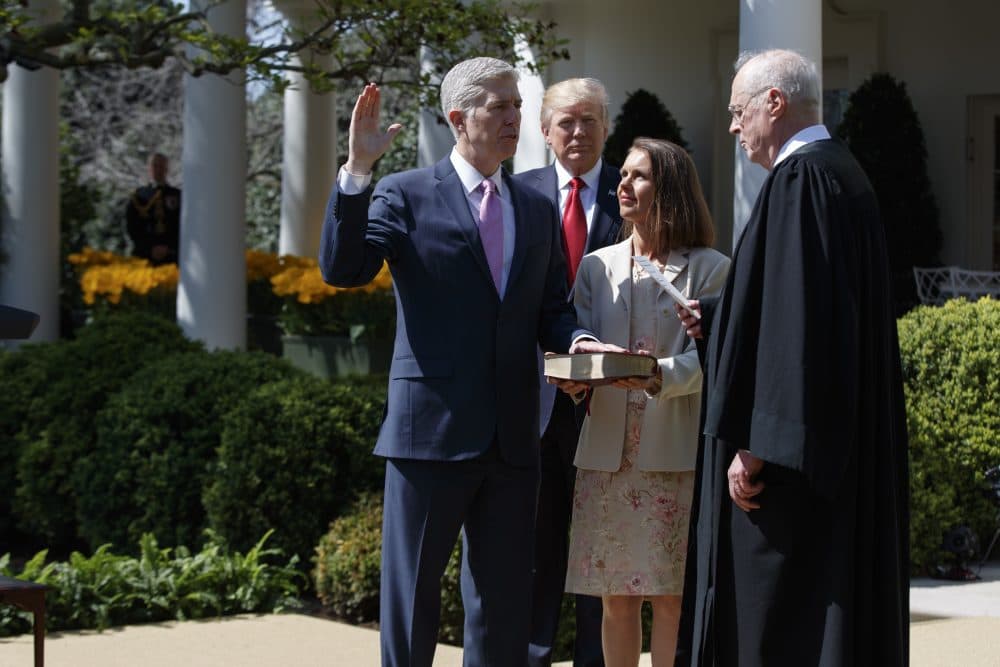Advertisement
All The President's Judges
Resume
This week on Freak Out And Carry On, Ron Suskind and Heather Cox Richardson talk with Alicia Bannon, senior counsel at the Democracy Program at the Brennan Center for Justice. They discuss President Trump's controversial judicial nominees and the history of the Federalist Society. They also suggest reforms to the American courts system. They also hear from Seung Min Kim, congressional reporter for Politico, and Ilya Shapiro, senior fellow in constitutional studies at the Cato Institute.
Excerpts
Ron Suskind: This week we're talking about President Trump and the courts, and I'm not talking about bankruptcy court. When Trump entered the White House he had more than 100 judicial vacancies and with that the ability to reshape our courts for decades.
Seung Min Kim: So Donald Trump has all these vacancies primarily due to one man in the Senate and his name is Mitch McConnell, the majority leader, a Republican from Kentucky. We saw the slowdown really began in 2015 when Republicans took over the Senate and McConnell became majority leader. Republicans in the Senate had really slowed down judicial nominees just systematically.
Heather Cox Richardson: So beyond McConnell blocking President Obama’s nomination of Merrick Garland to the Supreme Court, the Republican Senate block a bunch of nominations to lower courts in same way?
Ron Suskind: Exactly! They basically just pretended these nominees didn't exist. Let's just do a comparison: President Obama inherited only 54 openings from George W. Bush in 2009. President Trump received about twice as many opportunities to appoint judges in his image because McConnell and the Republicans were so effective in blocking Obama’s nominees in the last two years of his presidency. Trump’s actually on track to have more judicial confirmations in his first year than any president in the modern era! Do I need to repeat that sentence? More than any president in the modern era. And conservatives are rejoicing.
Ilya Shapiro: I think this is one area where Donald Trump has been having great success and a significant impact and he's doing so by deferring to real experts in the field that he can trust. And it's working. At this point he's made more nominations and had more judges confirmed than anyone in the modern era. I think that's that's a really big deal because of course tax reforms and health care reforms can be reversed or administrative guidances rescinded, as we've already seen, but federal judges are for life for many decades.
Ron Suskind: But unlike healthcare, trade, foreign affairs-- where we see a lot of Republican infighting, the judiciary seems to be one thing that can still unite the right. It is perhaps the most under-reported issue that helped Trump win last November.
Heather Cox Richardson: And it is worth remembering that federal judges hear cases on gun control, abortion, voter I.D. laws, immigrant issues. So even if we’re all focused on how Washington doesn't seem to be able to get anything done, the Trump administration is in fact having a profound and lasting impact through the third branch of government, the one we often tend to overlook, the judiciary.
Seung Min Kim: He’s having tremendous success in the Senate and it really is one of the untold success stories of Trump's presidency particularly because he needs only Republican votes to get this done. We know that legislation, most of the time, needs 60 votes in the senate, which means democratic corporations, But on important nominee--especially these judges who have life time appointments-- you can get them through pretty quickly.
Heather Cox Richardson: It's interesting that she said that "this is a great success story" because I think you can make the argument that if you become so extreme and you end up with nominees who don't, in fact, meet basic standards or represent what most Americans want, you're going to be facing, again, this huge crisis of legitimacy. Several of Trump's recent nominees have already faced that kind of a backlash. Four of them have been labeled "unqualified" by the American Bar Association. Unqualified! Including this guy, Brett Talley, who was nominated for a federal judgeship in Alabama. Talley had never tried a case. He didn't disclose to the Senate the little fact that his wife works in the White House which should have come up on his disclosure form, whether or not he had any conflicts of interests. And he worked for a year as what he said was a paranormal investigator... like X-Files. But, again, is this really the best we can do in our judgeships is somebody who is only three years out of law school? Another nominee Jeff Mateer actually said in a speech that the transgender children around us are evidence of "Satan's plan". Do we need to have religion this kind of religious extremism on our federal bench?
Alicia Bannon: Judges have a tremendous amount of power. They are shaping the legal landscape and they impact our rights, they impact businesses and bottom lines. One example to think about is Obamacare, which obviously has been in the news quite a bit recently. Back when it was passed, there was a huge effort to get the votes to pass Obamacare and then the lawsuits started. And I should say when the original challenges to Obamacare were brought most legal experts laughed at them. Most legal experts said that these are close to frivolous claims saying that Obamacare violated the Constitution, violated the Commerce Clause, all these different issues that were raised. But if you looked at the way the court had been shaped over many years, largely by eight years of a conservative president putting judges on the bench, by the time that case made its way through the courts those claims were not frivolous at all. And it went to the U.S. Supreme Court where it was one vote away from striking down President Obama's signature legacy by judges. I think that's just one example of the power that courts have. And we were talking earlier about who who pays attention to judges and I think what we've seen is that, historically, conservatives have really understood the importance of the court and the power of the courts in a way that the left really hasn't. And they haven't put as much political attention, mobilization, energy around the issues of judges and the judiciary. They haven't complained in the same way as when we've seen norms break down in the process of appointing and confirming judges. And you know I think we've seen that in who who ultimately has been populating the bench.
Heather Cox Richardson: Ronald Reagan's attorney general Ed Meese said that they're deliberately going to go after the judiciary because then the Reagan revolution is going to be cemented into America regardless of what happens in future elections. And earlier I mentioned Sandra Day O'Connor. I want to bring those two things together. Sandra Day O'Connor was, I believe, the last person on the Supreme Court to be a politician. And traditionally, in American history, we've always had politicians on the courts, especially the Supreme Court, because they are supposed to be able to build consensus with voters and to understand the mood of the country. And now we're in this weird moment where we have a judiciary that's being shaped largely by outside money and by ideology. Is that a legitimate concern? Is that what's going on and should we try and get politicians back on the court?
Alicia Bannon: I do think that there is a real issue with a lack of professional diversity on the bench. And there's also there's also a real lack of racial and gender diversity and we're not seeing that moving in a good direction under the Trump administration either. But you know we don't have. I mean I think there's a lot of areas where we could really benefit from having more representation of diverse perspectives that I think would really enrich the deliberations on the court you know public defenders would be another example of people who don't tend to have a voice in the judiciary. But I absolutely think that we would benefit from having more politicians on the bench. I mean I think I'm particularly struck by the court's recent jurisprudence on money and politics where the story that they've told about how money does or doesn't corrupt our political process seems to be a tremendously naïve notion of politics. I imagine that if you had more people who actually had run an election, who could speak from some personal experience, you might see more pushing back against some of these notions of what will and won't corrupt our process.
The views and opinions expressed in this podcast are solely those of the participants and do not in any way reflect the views of WBUR management or its employees.
